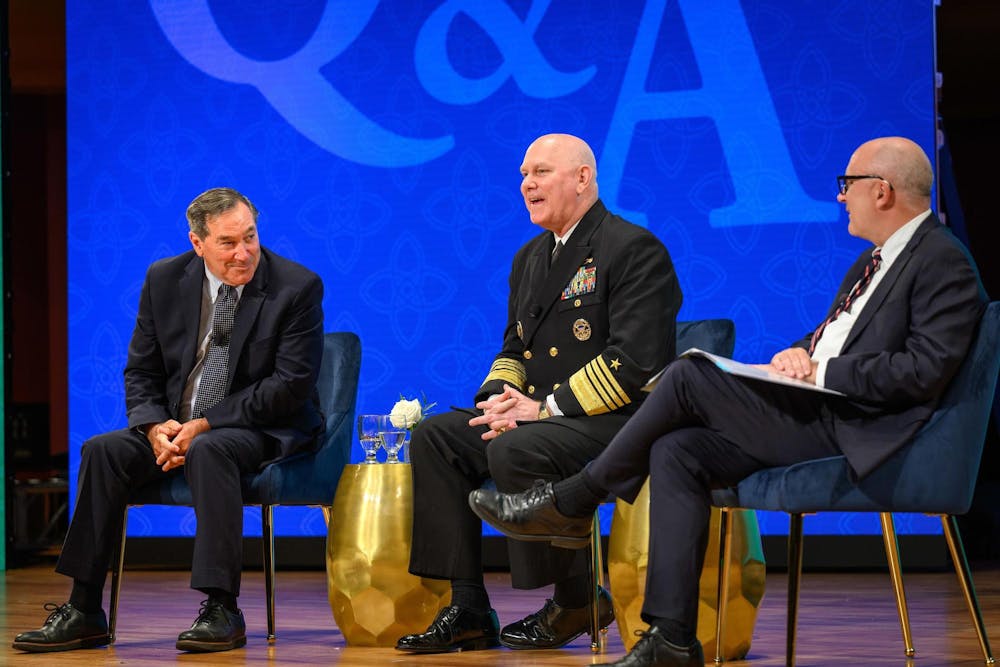In the fourth and final session of Thursday’s forum lectures, naval officer Christopher W. Grady and former United States Senator Joe Donnelly shared their insights on “advancing peace in a fractured world.”
They considered America’s key role in this mission and offered their takes on how to make the world a better place.
Donnelly, drawing heavily on his experience as Ambassador to the Holy See under the Biden administration, underscored the United States’ key role in future prospects for peace.
“When I would go overseas, the other ambassadors would come up on different events and go, ‘what’s the United States going to do,’” Donnelly said. “The world is looking towards us.”
Donnelly went on to underline America’s role in countries like Israel and Ukraine, particularly the United States’ part in countering Russian aggression by supporting Ukraine in the wake of Russia’s invasion.
Grady, for his part, drew on his experience as vice chairman of the Joint Chiefs of Staff when providing his take on the possibilities of lasting global peace.
“From my vantage point, I think the world we are going to give to our children is increasingly congested, competitive and one prone to conflict,” he began. “But in spite of all that, I don’t think that war is inevitable.”
Like Donnelly, Grady also stressed the necessity of American leadership. He elaborated on the challenges facing the United States, suggesting that the world had transitioned into a “multipolar moment,” with various groups, from non-state actors to great powers, posing threats to the United States.
Despite these obstacles, however, Grady’s overall sentiment remained positive.
“Why do I have great confidence? It’s because of the allies and partners that we have,” Grady said. “War is not inevitable. Peace has a chance.”
The conversation eventually shifted toward Donnelly’s experiences as ambassador to the Vatican and his interactions with the Holy See. For Pope Francis, Donnelly offered high praise, recalling his efforts to reunite Ukrainian children with their families and meet with families on both sides of the conflict in Gaza.
“The pope works for the least of us,” Donnelly remarked on the pope’s role in improving the world. “He truly is the reflection of what you would think Jesus might be on Earth.”
The conversation, however, soon shifted to rising global conflict, particularly the re-emergence of great power competition. Grady began the discussion by describing the rapid acceleration of technology and tactics, noting the threat posed by both Russia and China. He emphasized the need for deterrence and rebuilding America’s industrial base to combat these threats to global peace.
“Working with [allies] will be absolutely, absolutely critical,” Grady said.
Yet, despite the heavy focus on foreign affairs, the importance of domestic unity in achieving lasting peace was not lost throughout the forum.
“I worry about how everybody is almost an island of their own, as opposed to a country pulling together,” Donnelly said. “Let’s come together, and let’s be a strong nation that supports our allies and our friends.”
As for Grady, he conveyed the importance of truth in an ever “opaque” world, advising Notre Dame to continue the tradition of enabling students to “be part of the policy discussions” that will help forge “the right direction for the country.”
Grady’s desires were reinforced by Donnelly’s hopeful optimism about the rising generation of Americans and the aspiration to provide a more prosperous, peaceful and stronger future.
“What makes me feel optimistic are young people. They deserve from us our best,” Donnelly proclaimed. “We’re going to hand our kids a better, stronger America than was given to us.”










